Gil Interns
Our Karen M. Gil Internship in Psychology and Neuroscience has accepted 12 Gil interns for Spring 2024! Learn more about our current class of Gil Interns and their placement sites below.
____________________________________________________________________________
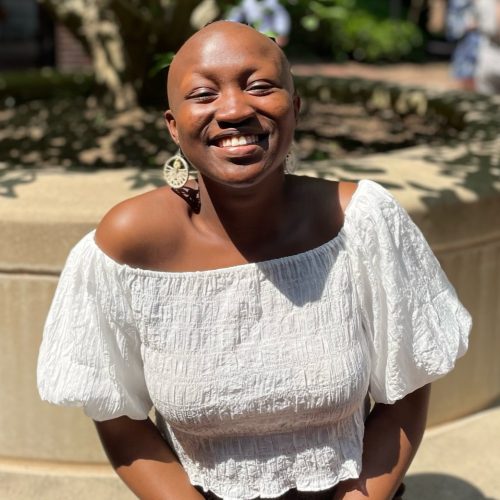
Akinola, Adunoluwa
Class of 2024
Behavioral & Integrative Neuroscience Intern
Duke Pain Prevention & Management Lab
aakinola1@unc.edu
Adunoluwa (Adun) Akinola is a senior from Kernersville, North Carolina. She is currently studying neuroscience with minors in chemistry and health & society. She has been a research assistant in the Social Neuroscience and Health Lab for over 2 years, where she works with a team of researchers to explore the bidirectional mechanisms of the brain and immune system, examining the impact of social stressors on inflammation and immune activation and vice versa. She is passionate about the interplay between social circumstances and health outcomes, and how they are mediated by neural pathways. Additionally, she is interested in the health implications of neuroscience research, as it is a rapidly evolving, ever relevant field. Specifically, she hopes to explore psychiatric approaches to evidence-based practice in the context of social determinants of psychological health, exploring both how interventions are developed and trends in who has access to them as well as what that means for their quality of life. After graduating, Adun intends to take a gap year before continuing on with medical education, where she hopes to be on the forefront of delivering evidence-based neurological care. When she is not studying or conducting research, Adun enjoys crocheting, reading, hiking, and spending time with loved ones.
____________________________________________________________________________
 Baddigam, Neyha
Baddigam, Neyha
Class of 2024
Clinical Psychology Intern
NC Maternal Mental Health MATTERS
nbaddigam@unc.edu
Neyha Baddigam is a senior majoring in neuroscience with minors in chemistry and data science. She is originally from Charlotte, North Carolina, and growing up in a large urban area exposed her to the realities of substance use disorders, specifically alcohol use disorder. She quickly became involved with this community, advocating for better health education for students, the development of resource guides, and subsidized access to resources for young adults struggling with use disorders. Here at UNC, Neyha has had the opportunity to work at the Bowles Center for Alcohol Studies, specifically, to research the symptomatology of alcohol use disorder to develop new treatments. As she further developed her understanding of this disorder, she began concentrating her efforts within the maternal population. Neyha’s passion lies in the field of human health, working to offer superior healthcare to this population. As a result, she intends to further explore the intersection of medicine and technology in greater detail. Neyha is currently working with a team to develop women’s healthcare technologies for use in low-resource settings. They are developing a home-based urine test for detecting pregnancy complications, specifically preeclampsia. Through projects like this, Neyha hopes to utilize innovation to improve the standard of care within the maternal population. Ultimately, she intends to attend medical school and continue to improve health outcomes by utilizing the intersection between research and biotechnology.
____________________________________________________________________________
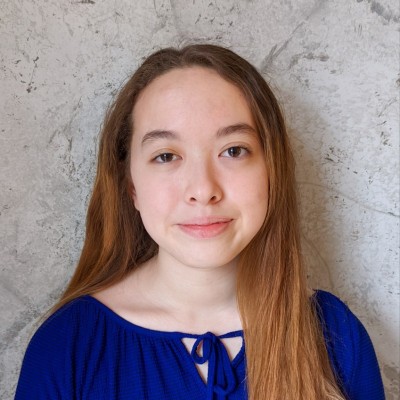 Chow, Emma
Chow, Emma
Class of 2025
Behavioral & Integrative Neuroscience Intern
Neurocognition Imaging and Research Lab
soulan@ad.unc.edu
Emma Chow is a junior from Greensboro, North Carolina, pursuing a double major in psychology and information science. At UNC, she works as an undergraduate research assistant at The Institute for Trauma Recovery, where she primarily assists in investigating the effects of vitamin D on musculoskeletal pain in motor car crash victims. In addition, Emma is a research intern at The UNC Brain and Early Experience Lab, examining the effects of biopsychosocial processes on development. She is passionate about contributing to clinical psychology research and informing mental health interventions. In the future, Emma hopes to pursue a career in clinical psychology research focusing on Post-Traumatic Stress Disorder and effective treatment modalities. She aims to contribute to reducing the gap in trauma research focusing on minority communities. In addition to her passion for psychology, Emma loves traveling to new countries, reading, and listening to music.
____________________________________________________________________________
 Dar, Noor
Dar, Noor
Class of 2024
Behavioral & Integrative Neuroscience Intern
UNC Adams School of Dentistry – Jacox Lab
noormdar@ad.unc.edu
Noor Dar is a senior from Greenville, North Carolina pursuing a B.S. in psychology with minors in neuroscience and chemistry. Coming from a family of immigrants and being interested in a career in healthcare she has always been passionate about addressing the needs of minority and underprivileged populations. Throughout her time shadowing physicians and dentists, she realized a great deal of the quality of care delivered was influenced by the emotional support the healthcare professional could provide the patient. This led her to pursue a degree in psychology to recognize and further understand its impact on patient care and outcomes as an aspiring healthcare professional herself. Over the summer she was a pharmacology and toxicology research assistant in the Rahman lab at the Brody School of Medicine where she investigated the role of estrogen in the expression of Angiotensin II in the liver. She also assisted in research studying the role of estrogen in Type 2 diabetes which helped develop her interests towards the role nutrition plays in maternal and fetal health in minority populations. Additionally, having a family history of ALS, she is interested in studying the neural mechanisms underlying the progression of this disease in order to formulate new treatment approaches and improve patient outlook. Outside of academics she enjoys playing lacrosse, reading, and hanging out with friends.
____________________________________________________________________________
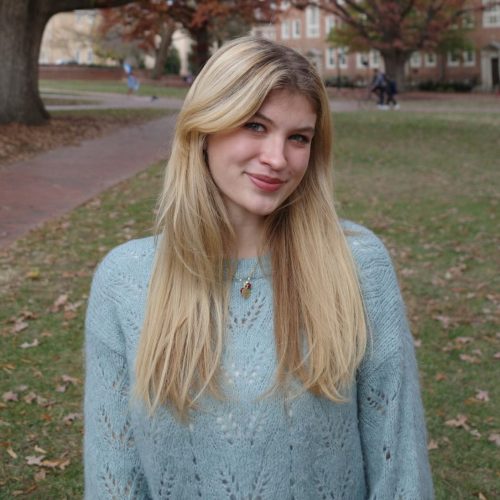 Davis, Gretchen
Davis, Gretchen
Class of 2025
Behavioral & Integrative Neuroscience Intern
UNC Early Brain Development Study
gdavis2@unc.edu
Gretchen Davis is a junior pursuing a B.S. in neuroscience and minors in chemistry and Spanish for the medical professions. Her interest within neuroscience centers on comprehending the intricate connection between biological brain pathology and the observable, tangible manifestations of behavior. She is passionate about expanding research initiatives that positively impact underserved communities. Her current research engagement involves contributing to a project at the Deshmukh lab, where she is utilizing the CRISPR-Cas9 system to target certain genes in neurons. The ultimate aim of this project is to develop the capability to knock out a multitude of genes associated with apoptotic and axon pruning pathways, thereby facilitating a deeper understanding of their roles in these intricate cellular processes. Beyond her academic pursuits, she finds fulfillment in clinical settings, where she values the raw human component of science and psychology. She has worked as a certified nursing assistant at UNC Medical Center float pool and has enjoyed working on psychiatric, pediatric, trauma, and maternal care floors. Her passion for women’s health has particularly flourished during her time on labor and delivery floors, and she plans to apply to medical school with the aspiration of becoming an OB-GYN specializing in the neurological implications of pregnancy. In her free time, she enjoys volunteering, advocacy, going thrifting, learning new recipes, trying to keep her many plants alive, and spending time with her friends and family.
____________________________________________________________________________
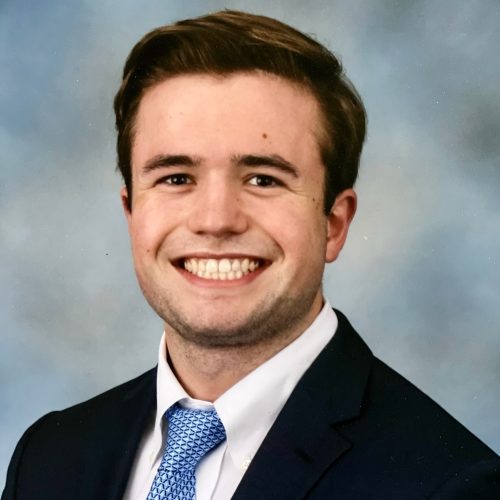 Gray, Richie
Gray, Richie
Class of 2024
Clinical Psychology Intern
UNC Department of Psychology & Neuroscience Community Clinic
richie.w.gray@unc.edu
Richie Gray is a senior from Belmont, North Carolina majoring in psychology (B.S.) with a minor in neuroscience and history. Before college, he worked as a job coach for individuals with neurodevelopmental disabilities, where he taught them to work in a professional environment and helped foster a sense of independence within each employee. This experience inspired Richie to pursue a degree in psychology and neuroscience as these areas of study fundamentally shape who people are. Richie is passionate about studying how the intersection between neuroscience and psychology can help explain the manifestation of certain psychopathologies, particularly anxiety-based and mood disorders. His first research experience at UNC was when he worked for the Fitting Lab as a research assistant, which studied the effects of phytocannabinoids on the behavior of mice diagnosed with neurodegenerative diseases. This initial experience piqued Richie’s interest in the field of research, which led to him becoming a research assistant at DEPENd lab. Richie worked on two studies within the lab, focused on researching deficits exhibited by those diagnosed with borderline personality disorder (BPD) in attentional and decision-making processes. This experience showed him how psychology and neuroscience intersect when trying to understand how psychopathologies manifest within an individual and how they subsequently affect their behavior. These experiences have inspired Richie to pursue a career in clinical psychology. He wishes to investigate the neurological and psychological underpinnings of those suffering from anxiety-based and mood disorders and how to best optimize treatment based on these findings. Particularly, Richie wishes to serve those who cannot always afford quality treatment, as these populations are oftentimes neglected. Outside of academics, I enjoy hiking, weightlifting, spending time with my cat, and volunteering!
____________________________________________________________________________
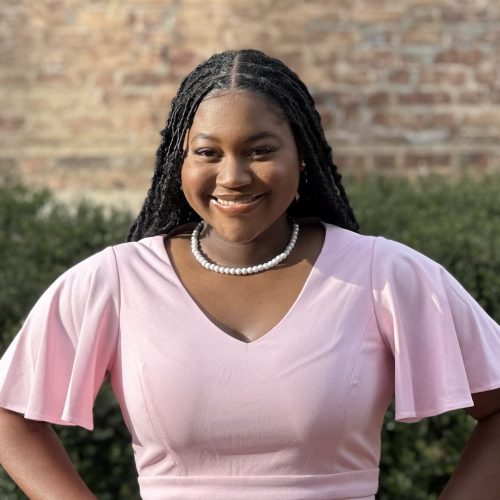 Jones, Jade
Jones, Jade
Class of 2025
Quantitative Psychology Intern
UNC Neuro Image Research and Analysis Lab
jadej02@ad.unc.edu
Jade Jones is a junior from Atlanta, Georgia, majoring in neuroscience with a minor in chemistry. Her interest in neuroscience is driven by her fascination with how social and biological factors contribute to antisocial behaviors. Specifically in the context of crime, she is interested in the complexity of the “nature vs nurture” debate. Jade has actively engaged in research under the mentorship of Dr. Sabrina Robertson, focusing on the impact of a growth mindset on the academic performance and persistence of underrepresented college students, which has further fueled her passion for psychology and neuroscience. At UNC, she serves as the vice president of Culinary Medicine, the secretary of Alpha Kappa Alpha Sorority, Inc., and a member of the Black Student Movement, Minority Association of Pre-medical Students, and the Random Acts of Kindness Club. She is also an avid participant in intramural futsal, soccer, and volleyball. In her free time, Jade enjoys watching TV, playing sports, listening to music, and baking. Post-graduation, Jade plans to attend medical school, aspiring to become an anesthesiologist or neurologist.
____________________________________________________________________________
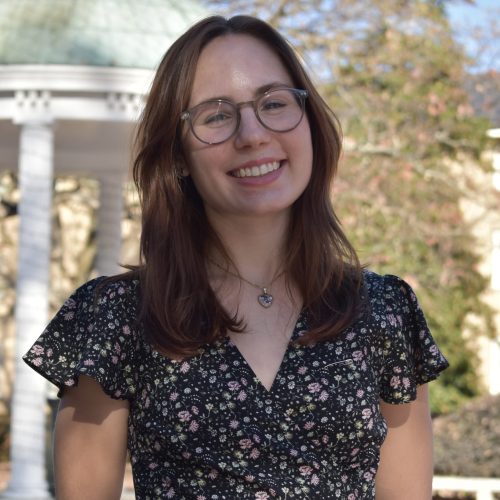 Levite, Stevie
Levite, Stevie
Class of 2025
Clinical Psychology Intern
3-C Family Services
slevite@unc.edu
Stevie Levite is a junior from Apex, North Carolina, pursuing a B.S. in psychology with a minor in biology. She is passionate about child psychology, focusing on disability studies and advocacy. During the summer of 2023, she obtained her certification as a Registered Behavioral Technician. She was fortunate enough to work directly with children with autism and various disabilities, taking a strengths-based approach toward her therapeutic treatments. In the spring of 2023, she volunteered as a behavioral coder in Dr. Algoe’s EASIR lab, which studied the complexities of romantic relationships. In the spring of 2024, Stevie will begin her role as a volunteer at the Carolina Institute of Developmental Disabilities under the supervision of Dr. Grzadzinski. As a volunteer, she will assist in data entry while observing the clinical aspect of research and data collection. Her experiences have taught her that autism is not something to “treat”, and she seeks to develop therapeutic methods to help the individual adapt to a lifestyle that fulfills their goals and doesn’t erase their identity. After graduation, Stevie plans to pursue a Ph.D. in Clinical Psychology. Beyond disability studies, she is interested in researching discrepancies in various pathological diagnoses between race and gender. Additionally, she is interested in studying the impact of a family unit on a child’s socioemotional development. In her free time, Stevie enjoys antique shopping, spending time with her friends, and seeing the beauty within mundane moments
____________________________________________________________________________
 Nayakwadi-Shah, Kirina
Nayakwadi-Shah, Kirina
Class of 2025
Clinical Psychology Intern
UNC Mother Infant Research Studies
belakir@ad.unc.edu
Kirina Shah is a junior from Asheville, North Carolina pursuing a B.S in psychology, as well as minors in neuroscience and medical anthropology. Since sophomore year, she has been a research assistant at the Carolina Center for Neurostimulation in UNC’s Department of Psychiatry with Dr. Flavio Frohlich, where she studies the role of neural oscillations in human cognition using non-invasive brain stimulation. Currently, she is working on a clinical pilot study that is investigating whether the personalization of weak brain stimulation (t-ACS) improves the sleep and memory of adults over fifty. Working in Dr. Frohlich’s lab has allowed Kirina to explore the knowledge gap in psychiatry and how it informs future research and preventative measures. Beyond her work in research, Kirina is passionate about mental health advocacy in underrepresented populations, particularly concerning POC. In her free time, she volunteers at UNC Hospital on the adolescent psychiatry floor, where she has been able to build one-on-one relationships with a wide variety of patients and works as a middle-school tutor. After graduation, Kirina hopes to attend a JD/PhD program and ultimately become a mental health lawyer and advocate.
____________________________________________________________________________
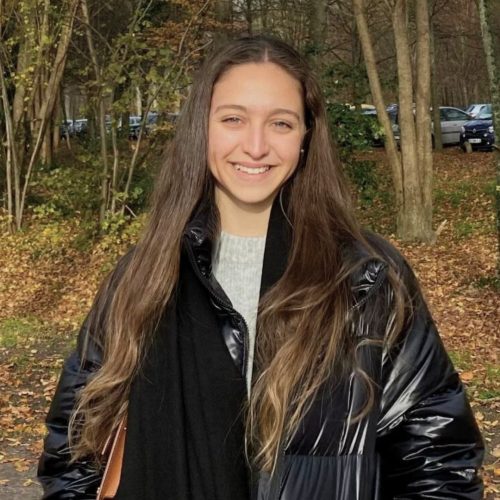 Noriega Talleri, Camila
Noriega Talleri, Camila
Class of 2025
Social Psychology Intern
UNC Weight Research Program
cnoriega@unc.edu
Camila Noriega Talleri is a junior from Lima, Peru pursuing a double major in psychology (B.A.) and sociology (B.A.) with a minor in data science. After taking a sociology class on happiness as a first-year student at UNC, Camila developed a passion for positive psychology and designing effective behavioral change strategies to improve quality of life. She joined Dr. Barbara Fredrickson’s PEP lab during the Spring 2023 semester, where she presented research on positivity resonance and civic engagement behavior and is currently in the process of running analyses on associations between gratitude and satisfaction with life. As an international Latin student, she hopes to integrate her background into the field and consider a more globalized and diverse framework for happiness and wellbeing research, with equity and justice at its core. After graduation, she hopes to pursue a masters in behavior change to both understand behavior and address social and health challenges, striving for positive societal change. Outside of academics, Camila is a voracious reader and loves running.
____________________________________________________________________________
 Pei, Yifei
Pei, Yifei
Class of 2024
Social Psychology Intern
Lenovo
yifeipei@ad.unc.edu
Yifei Pei is a senior from China (Shenzhen) double majoring in psychology and economics. She has been a research assistant for Dr. Sheeran Paschal since May 2022, where she evaluated the effectiveness of various behavioral interventions. Additionally, she has been working on a meta-analysis project examining behavior change techniques (BCTs) directed by Dr. Nisha O’Shea since April 2022. In Summer 2023, she conducted independent research to explore the effect of an in-school health advocacy program on adolescents’ BMI and smoking frequencies, supported by the Guest Family Fund for Excellence in Economics and advised by Dr. Chris Handy. She is also working on her honors thesis on exploring the distinct components of motivation in goal pursuit and has been honored to receive two Lindquist Awards and a Taylor and Gold Summer Research Fellowship to support her research. In her free time, she enjoys baking/cooking, reading, and playing/sleeping with her cat, Peachy.
____________________________________________________________________________
 Waddell, Katy
Waddell, Katy
Class of 2024
Social Psychology Intern
Carolina Performance
katywaddell@unc.edu
Katy Waddell is a senior from Canton, Georgia pursuing a double major in English (B.A.) psychology (B.A.). She currently works as an undergraduate research assistant for the HHIVE (Health and Humanities: an interdisciplinary venue for exploration) lab where she has worked on a project related to expanding opportunities for outdoor recreation in order to improve mental health outcomes in marginalized communities. Katy has also begun work on a study focusing on the ways in which media and rhetoric have influenced concussion recovery outcomes for women over the past decade. She believes that studying the biased portrayals of concussion in the media may raise public awareness of concussion in females and inspire further work on best practices in concussion rehabilitation for women. After graduation, Katy aspires to pursue a career in sports psychology, focusing on assisting athletes suffering from long-term or chronic injuries or illnesses.
____________________________________________________________________________

